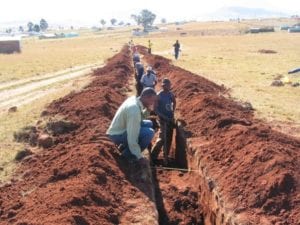The vision underpinning the National Water Resource Strategy 2(NWRS-2) is a democratic, people-centred nation with equitable social and economic development enabled through equitable, sustainable and effective water management.
Also included in the vision are these vital points:- water valued and recognised as a strategic national asset and fulfilling its central role in society and the economy
- a prosperous society enjoying the benefits of clean water and hygienic sanitation services
- a healthy, ecologically sustainable and protected water environment
- a Department of Water Affairs and related water management institutions that serve the public effectively and loyally, meet their responsibilities with integrity, transparency, energy and compassion
- a committed and dedicated water sector, actively cooperating and contributing towards sustainable water management and associated outcomes.
- A rigorous focus on implementation of policy and legislation, applying basic principles of good governance (“do the basic things right”). This includes good planning, effective organising, leadership,and control and programme management.
- Extending water governance to include integrated planning, governance and sector partnerships, looking outside the water box to work with other critical sectors such as agriculture, mining, land reform, industrial development and environment.
- Ensuring the involvement of stakeholders and sector partners in planning and management of waterresources, including the marginalised and the poor.
- Continuing to extend the water management model to include options such as water use efficiency,local resource optimisation (groundwater), reuse, desalination, systems optimisation, improvedregulation and control.
- Taking a comprehensive view of water management across the entire value chain from resource to tapand back to resource.
- Applying smart solutions by focusing on functionality, sustainability, technology, accountability, sectorinvolvement and ownership, and harnessing the considerable research and development capability in South Africa behind this programme.
- Mobilising the extensive capacity and knowledge in South Africa, including at the community level andin the NGO and private sectors, and drawing from a range of knowledge sources including indigenous knowledge systems.
- Building a capacitated sector and workforce.
- Applying effective management principles such as life cycle management, sound asset and financial management, customer care and communication.
- Ensuring the speedy establishment and transformation of the necessary water sector institutionsto achieve implementation of the national water resource strategy and the aims and objectives ofnational water and development policy.
- Measuring impact by a focus on the achievement of outcomes, not just outputs.
- is about developing and managing water resources and delivery of services
- includes a range of issues intimately linked to water – from health and food security to economic development, land use and the preservation of the natural world on which water resources depend
- is concerned with drawing up and adopting the right laws, policies and institutions – also how these are established, enforced and implemented governance in the water sector has political, administrative and economic dimensions and includesboth the activities of government, as well as the interaction of civil society with these processes
Although much has been achieved since 1994, the performance of the sector has fallen short of expectations in three important respects.
The outcomesof the sector relative to sector goals have been disappointing. Although substantial progressin increasing access to water and sanitation has been made, this progress has slowed in recent years andthe number of people without adequate services is still too large, particularly among the poor. Secondly,progress in allocating water for productive purposes to promote transformation has been very slow and wateruse patterns are still highly skewed and unequal. Thirdly, the stresses on water are increasing and water isnot being managed in a sustainable manner. In other words, service delivery has fallen short of expectations. Uncertainty and a lack of clarity lead topoor performance Proposed institutional reforms such as the creation of catchment management agencies and an entity to manage national water infrastructure have not taken place. In addressing this poor performance, it is necessary to address legal, institutional and implementation issues. The National Water Act and the Water Services Act are currently under review in order to address a number of challenges currently faced in the water sector. Promoting a deliberative and participatory agenda will also require adjustments in the structure and functions of water institutions. Issues related to expertise, accountability, and democratic authority must be addressed in an integrated way at the highest level in the Department of Water Affairs. There is therefore the need to strengthen the capacity of the department at local, regional, and national levels to integrate the consolidation of democratic practices across the sector. But the intensity and scope of consolidation needed to advance democratic practices exceeds the mandate of any one department. All departmentsand non-governmental entities that have a direct relevance to water should be involved. Aligning all such departments and organisations to focus on water requires the use of political capital. The NWRS-2 addresses the proposed institutional arrangements to improve water resources management,within a governance framework that ensures that all water management institutions serve the national developmental agenda. Core values Sustainability and equity are identified as central guiding principles in the protection, use, development, conservation, management and control of water resources. These guiding principles recognise the basic human needs of present and future generations, the need to protect water resources, the need to share some water resources with other countries, the need to promotesocial and economic development through the use of water and the need to establish suitable institutions in order to achieve the purpose of the Act. (Summary of Chapter 1 of the National Water Act) Making it happen: The corewater strategies The National Water Resources Strategy encompasses the following critical thrusts:- Building an efficient water administration by fostering innovation and knowledge management,investing in people’s capabilities, cultivating a more water educated and literate society, as well asincreasing economic growth and social development.
- Promoting an equitable water sector by eliminating unequal access to water and reducing imbalances within and among groups as well as regions, perpetuated largely by pervasive administrative inefficiencies.
- Sustaining high water infrastructure investment and development by strengthening the sources ofgrowth, the financial, corporate and water institutions as well as investing in pro-poor local level infrastructure.
- Enhancing indigenous knowledge systems to meet the challenges of globalisation, focusing on the role of women and the youth. The Water Research Commission should be required to conduct research onindigenous knowledge systems, focusing on the role of women and the youth.
- Developing a knowledge-based water sector as a strategic move to raise the value added of all water initiatives and optimising the brain power of the nation. In this regard, also, the Water Research Commission has a special role to play.
- Strengthening human resource development to produce an efficient, effective and knowledge able workforce.
- Pursuing water security and environmentally sustainable development to reinforce long-term growth.
- Pursuing sound infrastructure management, and ensuring prudent investment policies as well as enhancing efforts to develop a knowledge-based water economy.
- Strengthening and streamlining redress strategies and mechanisms to ensure balanced participation among and within cultural and income groups as well as enhancing performance of water institutionsthrough improvement in user’s knowledge, skills and expertise as well as upgrading innovation, scienceand technology.
- Increasing efficiency and economic growth through accelerating the shift of the work-force towards more efficient performance processes and high-value added activities. However, this should not be done at the expense of jobs; and the growth must have job creation as its basis and rationale.
- Expanding the usage of ICT across and within the water sector to accelerate the growth process.
- Strengthening the human resource base to ensure the availability of person power with higher levels of knowledge, technical and analytical skills.
- Adopting an integrated approach in addressing water quality and environmental issues to attain sustainable development.
- Enhancing further the quality of life through improving accessibility to quality water as well as developing the aesthetic and spiritual dimensions of water.
- Intensifying efforts to nurture and inculcate positive values and attributes among users through theeducation system, social and religious organisations and the media.







